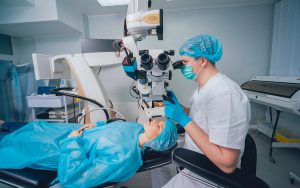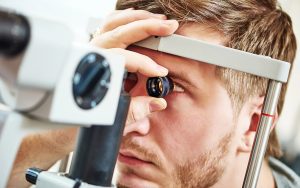Eye Care Tips To Protect Your Vision

Every now and then, you may worry about your vision. Perhaps you forgot to wear your sunglasses today or have been sitting in front of your device for longer than usual. Perhaps you’ve been watching too much TV and the migraine makes you wonder if you now have a vision problem.
This is a concern for many people but you do not need to worry. We all occasionally skip an eye appointment and neglect caring for the eyes. But it does not mean you will end up blind. You just need to make an effort to take care of your eyes.
There are many ways you could be harming your eyes but small lifestyle changes can protect your vision. Luckily, we have the best tips to keep your eyes working well. Keep scrolling to learn more.
1. Blink a little more
Have you been blinking since you started reading this post? Blink a few more times just to be sure! The average person blinks 15-20 times per minute. However, this number significantly decreases when we stare at screens.
If you have been watching movies or scrolling on your phone all day, then you have not blinked as much. If you do not blink enough items, your cornea does not receive a fresh coat of moisture, leading to dry eye. This contributes to eye strain. Therefore, for every 20 minutes you spend on a screen, look at an object 20 feet away for 20 seconds and let your eyes blink naturally.
2. Sit a little farther from the screen
No, sitting too close to the TV will not ruin your vision or make it less precise. This common myth once used by parents on children has stuck with many people throughout their lives. While sitting too close to the screen will not affect your vision, it will give you headaches and cause a lot of eye strain.
The headaches you get from sitting near the TV are from strain. Therefore, sit a little farther to minimize the effects of contrast and glare. Experts recommend sitting an arm’s-length from the computer. Additionally, put hand-held screens at least 16 inches away from your face.
3. Wear UV sunglasses outside
Do you skip wearing sunglasses on cloudy days? Sure it might not be the best fashion statement, but it will protect your eyes. Consistent exposure to ultraviolet rays (UV) will deteriorate your vision through macular degeneration and cataracts. Therefore, you need a protective pair of sunglasses that block out 99-100% UVA and UVB rays. Remember that UV rays penetrate cloud cover, so cloudy days still require sunglasses. Polarized sunglasses reduce glare but they do not offer protection against harmful UV.
4. Adopt a good diet
All parts of your body, including the eyes, respond to what you put in it. Therefore, good eye health is dependent on your diet. Nutrients like lutein, omega-3 fatty acids, zinc, and vitamins C and E will fight against age-related vision problems.
Eat more green leafy vegetables, oily fish like tuna and salmon, oysters and pork, citrus, and non-meat proteins. A good diet will also keep your weight in check, preventing lifestyle diseases and other conditions that could trigger eye problems.
5. Manage diabetic risk factors
Diabetes can increase the risk of developing glaucoma. Therefore, you need to stay on top of any risk factors of diabetes.
Ensure that you manage your weight and blood pressure to prevent this from happening. Additionally, ensure that you see your general doctor every other while to ensure that you are not at risk. Check your family medical history and share it with your general doctor.
6. Care for contact lenses
Your contact lenses could deposit bacteria into your eyes, causing a lot of infections and vision problems. Therefore, you need to take precautions when wearing and removing contact lenses. Always wash and sanitize your hands to prevent depositing bacteria and germs onto the lenses.
Always use contact lens solution to clean and wear your contacts. If your contacts feel scratchy, wear your glasses because you could be developing an eye infection and your contacts will make it worse.
7. Avoid old makeup
Expired makeup could leach harmful components in your eyes and skin around the eyes. This could lead to harmful infections. Additionally, old makeup could harbor bacteria that spread to the eyes.
Therefore, you should renew your makeup regularly. You should also ensure that you clean your brushes and re-sharpen makeup tools.
8. Quit smoking
Smoking is a habit that has a lot of health repercussions on the body, including your eyes.
Smoking tobacco cigarettes increases risks of developing cataracts. It can also cause macular degeneration and damage the optic nerve. Smoking is one of the worst things your body can experience medically. Therefore, try to kick the habit. Even if you backslide, keep at it because the more you try, the more likely you succeed.
9. Use safety equipment
Next, ensure that you use safety equipment to protect your eyes. Ensure that you wear safety goggles whenever you work with chemicals, electricity, and other dangerous environments. Even with something such as home repairs, ensure that you wear protective gear.
10. Learn about family eye health history
Glaucoma and age-related macular degeneration can run in families. Therefore, you could be at risk without knowing. You need to learn more about your family’s eye health history and share it with your doctor.
The next time you sit with family, ensure that you bring up family health history to learn if you are at risk of any diseases. Your eye doctor will help you take steps to prevent the diseases from taking over.
11. Go to your eye doctor regularly
And finally, ensure that you visit the eye doctor regularly. Your eye doctor should be able to tell if you are at risk of any infections and diseases. Regular check-ups help with early diagnosis, translating to better chances of recovery.




